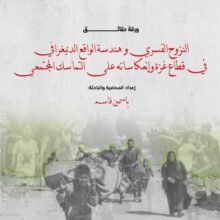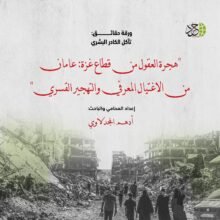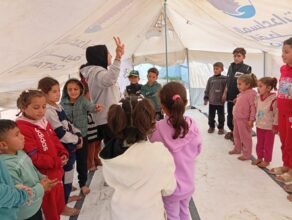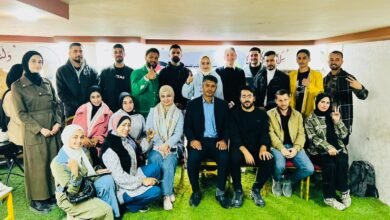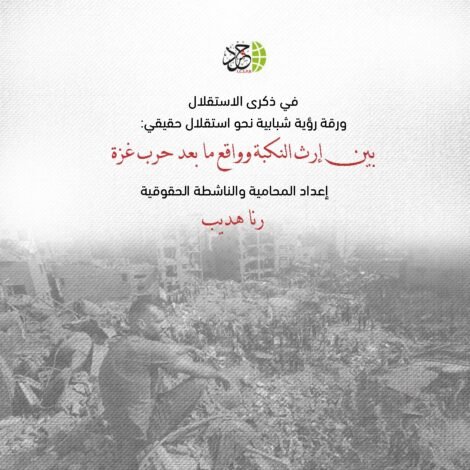
ICSPR issues a new youth vision paper on Independence Day: “Between the legacy of the Nakba and the post-Gaza War reality… toward a genuine independence that begins with the human being”
Date: 15 November 2025
Press Release
ICSPR issues a new youth vision paper on Independence Day:
“Between the legacy of the Nakba and the post-Gaza War reality… toward a genuine independence that begins with the human being”
On the occasion of Independence Day, the International Commission to Support Palestinian Rights (ICSPR) released a new youth vision paper prepared by lawyer and human rights activist Rana Hdeib, titled:
“On the anniversary of the Declaration of Independence… A Youth Vision for Genuine Independence: Between the Legacy of the Nakba and the Post-Gaza War Reality.”
The paper offers an in-depth reading of the major transformations experienced by the young Palestinian generation after the Nakba and the successive wars, particularly the Gaza War (2023–2025). It emphasizes that, in the consciousness of youth, independence is no longer tied to symbols and slogans as much as it is connected to justice, accountability, and the development of both human beings and institutions.
77 years after the Nakba and 37 years after the Declaration of Independence… an absent independence that requires redefining
The paper explains that more than seven decades have passed since the Nakba, and more than three decades since the Declaration of Independence, while Palestinians continue to live under occupation and deep internal political division.
It notes that the young Palestinian generation has “inherited the Nakba as a consciousness rather than an event,” and that its political awareness has been shaped by repeated cycles of loss, siege, and war—foremost among them the recent war on Gaza, which revealed — according to the paper — the fragility of political structures, the collapse of the protection system, and the erosion of the role of the official leadership.
The paper affirms that young people now view independence as a cumulative national project that begins with the human being before geography, and with justice before political symbols.
The paper highlights that the war on Gaza represented a historic turning point in the consciousness of the new generation; it demonstrated that the absence of a state means not only the absence of a political entity, but also the absence of protection and responsibility.
Citing youth interviews, the paper states that the question repeated during the war was not:
“Where is the state?”
but rather:
“Is there still a state at all?”
The paper argues that youth have begun to differentiate between liberating the land and liberating the human being, and that genuine independence, in their view, means independence from external occupation as well as from internal authoritarianism, corruption, political patronage, and leadership that lacks popular and political representation.
According to the paper, recent public opinion polls showing that more than 80% of youth do not trust the political leadership reflect the depth of the national crisis.
It notes that this gap has produced a new understanding: “There is no independence under a divided political system that is not subject to accountability,” and that the national future requires the formulation of a unified Palestinian project that expresses the popular will.
The paper stresses that, for the new generation, independence begins with dismantling traditional political structures, renewing legitimacy, and building genuine institutions rooted in transparency, rights, and good governance.
The paper examines the social and psychological shifts experienced by Gaza’s youth in particular after the war, noting that an entire generation has emerged from the ruins carrying deep wounds, yet has simultaneously launched waves of civic, community, and entrepreneurial initiatives that have reshaped the meaning of resilience.
The paper highlights several examples, including:
• Relief and self-help initiatives
• Legal documentation platforms
• Digital diplomacy efforts
• Anti-corruption protest movements
• Emerging economic projects despite widespread destruction
It underscores that this contradiction between pain and determination constitutes the most important national asset that must be built upon.
The paper proposes a practical framework for achieving genuine independence based on:
-
A state of institutions, not patronage
Through comprehensive political reform restoring the separation of powers, the rule of law, and judicial independence. -
Transitional justice that restores trust
By documenting violations, providing reparations, ensuring accountability, and preventing the repetition of abuses. -
A resilient, production-based economy
Through reducing dependency, supporting small enterprises, the digital economy, and local value chains. -
A rights-based political discourse
Reframing the Palestinian narrative in the language of justice, dignity, and human rights globally. -
Meaningful youth participation in decision-making
Through youth councils, policy chambers, and direct representation committees inside national institutions.
The paper calls for a series of implementable steps, including:
• Establishing a National Vision Platform that unifies youth initiatives within a shared framework.
• Launching a youth-led “Resilience and Reconstruction Policies Program.”
• Pressuring for general elections and the renewal of political legitimacy.
• Forming youth research teams to follow transitional justice files.
• Strengthening youth capacities in digital diplomacy and public engagement.
ICSPR concludes its press release by emphasizing that the paper sheds light on a historic transformation in the consciousness of the young Palestinian generation, which now views independence not as a passing anniversary or symbolic document, but as a long-term national liberation project that begins with building the human being and safeguarding their dignity and rights.
The paper stresses that the young generation is the true heir to the national liberation project, and that rebuilding trust between society and leadership — and transforming the energy of pain into constructive action — is the realistic path toward a genuine independence worthy of the sacrifices of the Palestinian people.


